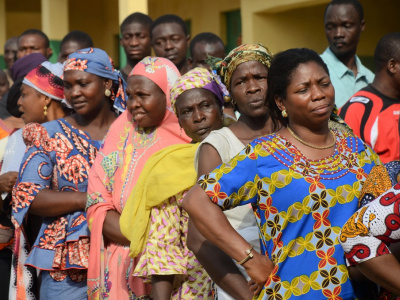
Empowering women in Africa: The only way to achieve food security
What's on this page
Girls and young women represent a crucial invisible labour force in the developing world, as Carmen Torres explains in her recent article for the Girls Rights Gazette. They play a key role as producers of food, managers of natural resources, income earners, and main caregivers of their families and communities. Nevertheless, gender-based discrimination denies rural women and girls equitable access to land, information and productive resources, opportunities for formal employment, equal access to education and health care, as well as the power of decision-making. Yet, research has demonstrated that increasing women's human capital is one of the most effective ways to reduce poverty. A slight increase in women’s assets, education and income has immediate positive multiplier effects such as increasing agricultural productivity and reducing child malnutrition. A McKinsey study claims that if women were involved in the economy to the same extent as men are, the world’s economy could grow by 26 percent by the year 2025.
The momentum in Africa
As the World Bank has pointed out, the promotion of gender equality and empowerment of women is “smart economics”. In West Africa and Eastern/Southern Africa, the two regions where ECDPM’s Food Security programme is widely engaged, the Economic Community of West African States (ECOWAS) and the Common Market for Eastern and Southern Africa (COMESA) have acknowledged this crucial role of women. There seems to be a momentum to mainstream gender in agricultural and food security policies and programmes. This is a remarkable tendency. After all, gender relations are essentially power relations, which means that gender awareness implies acknowledging the power dynamics behind them. This awareness is a prerequisite for understanding individuals’ access to and distribution of resources, their ability to make decisions and the ways in which women and men (and boys and girls) are affected by political processes and social development. Nevertheless, progress has been slow and little has been done concretely to move from words to action. A number of quick wins have been identified by ECDPM Food Security programme to increasingly mainstream gender in West and Eastern/Southern Africa agricultural and food security policy processes. Photo courtesy of C.Schubert via FlickrECDPM’s way forward
In West Africa, a few key results have been achieved in the context the West Africa Agricultural Productivity Program’s gender policy. Moreover, a working group on gender was established in October 2015, in the context of the ongoing review process of the ECOWAS Agricultural Policy (ECOWAP), to contribute to making the 2nd generation of ECOWAP national and regional agricultural investment plans gender sensitive. It is crucial to support these initiatives and the stakeholders involved to address gender inequalities when applicable. A promising area to start strengthening our gender-sensitivity is (informal) agri-food cross-border trade, as it is believed that West African women are largely involved in these activities. This implies being more explicit about gender imbalances, identifying policy measures that could be taken to address those and facilitate dialogue for uptake. In the case of the COMESA region, a COMESA Gender Policy has been adopted in 2002, aiming to mainstream gender across all COMESA activities (e.g. promoting women’s access to land, production, technology). It is supposed to be implemented by the Gender and Social Affairs Division. The current ECDPM Food Security work on value chains and intra-regional trade development offers opportunities to mainstream gender. For example, within the framework of COMESA’s Regional Investment Programme in Agriculture II, we are supporting the setup of regional public-private platforms, centered around key value chains in sub-regions of COMESA. We can foster gender mainstreaming in this process, for instance, by suggesting the establishment of a working group on gender. Secondly, our emerging work on climate-smart agriculture in the COMESA and the ECOWAS regions and in the broader African context, is an ideal entry point to add gender awareness to our efforts. In the COMESA region, as stated in Hanne Knaepen’s briefing note on climate-smart agriculture in Africa, gender policies are still paper policies in many countries. However, recent developments show that there is hope for gender-sensitive policies on climate and agriculture. For instance, the High Level Forum of Climate Smart Agriculture Stakeholders convened by ECOWAS and its partners in June 2015 led to the establishment of a Gender Task Force to foster gender mainstreaming in this initiative. In addition, when looking at the Intended Nationally Determined Contributions submitted by the parties to the United Nations Framework Convention on Climate Change, almost forty percent refer to gender equality as an important goal of climate policy and action, while more than sixty percent included agriculture in their adaptation strategies. ECDPM’s work on Food Security, including facilitation activities, brokerage and policy research, would miss out important aspects if not adopting a gender sensitive approach. Hence, a pragmatic rationale, in line with African initiatives and up-to-date research findings, is necessary to engage in gender-sensitive analysis of food security challenges in Africa. The views expressed here are those of the authors and not necessarily those of ECDPM.
Loading Conversation

